AWM41 990 - [Nurses Narratives] Sister C Keys
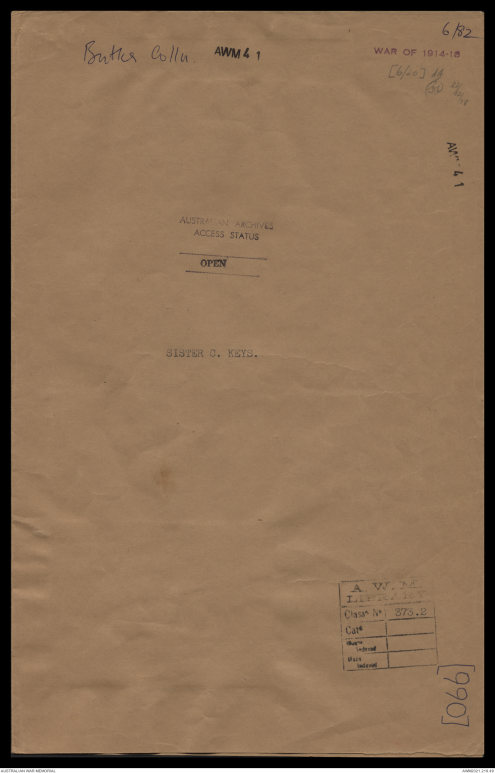
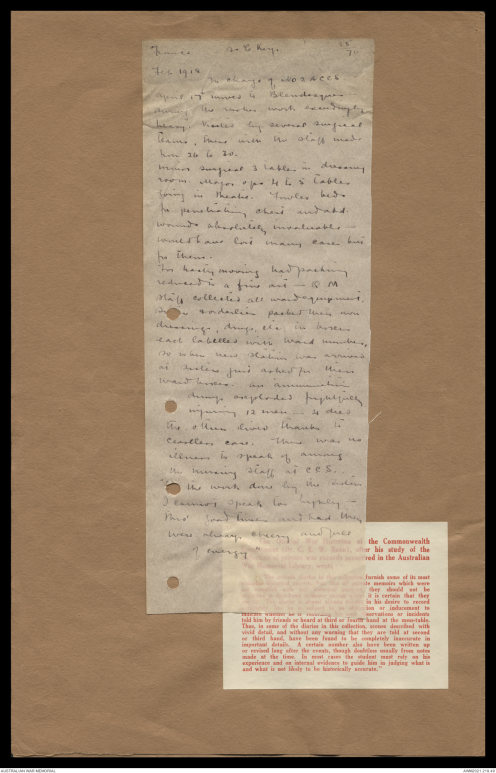
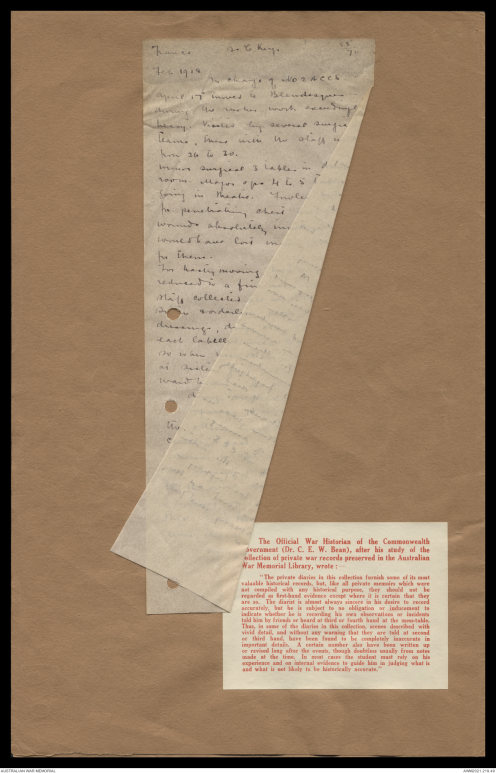
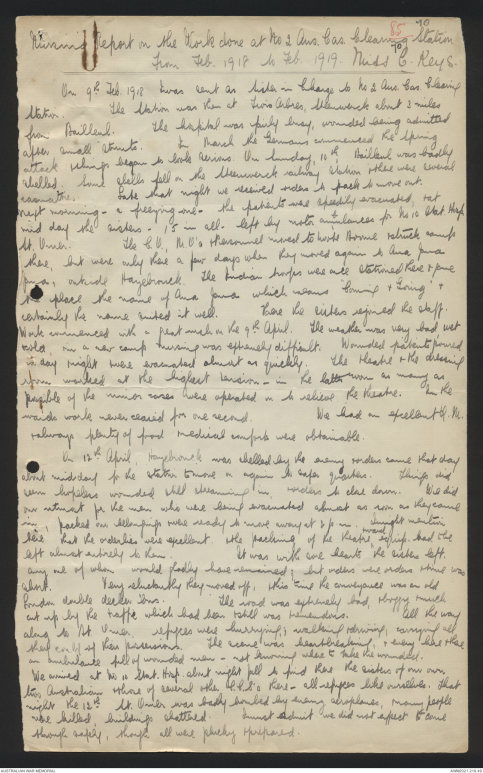
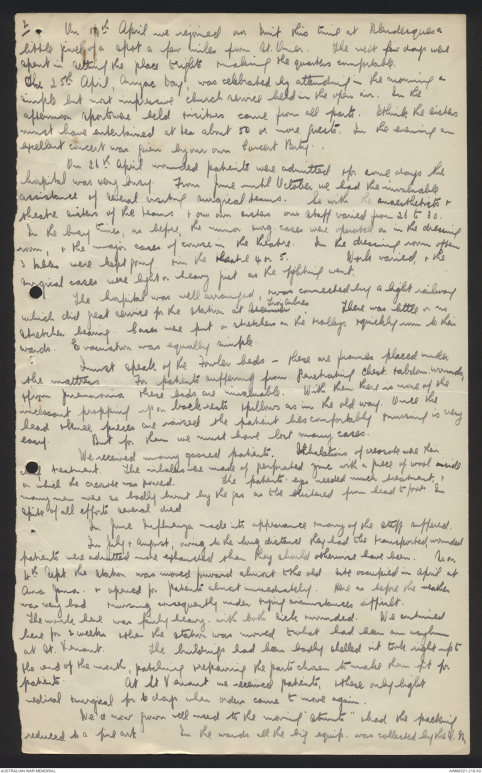
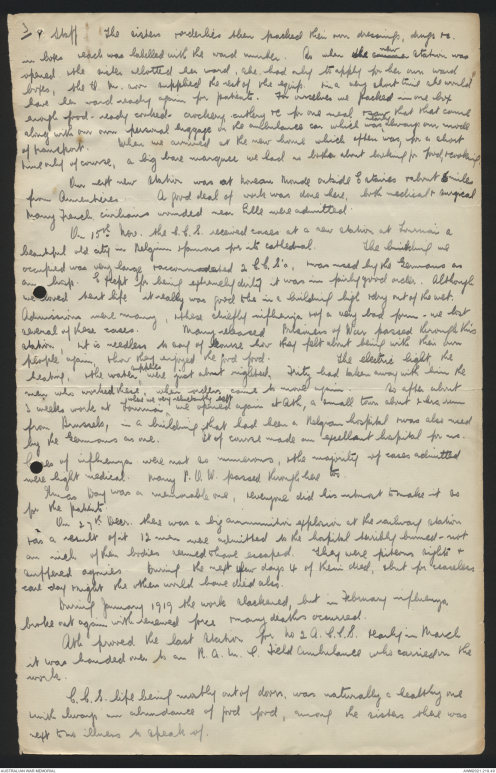
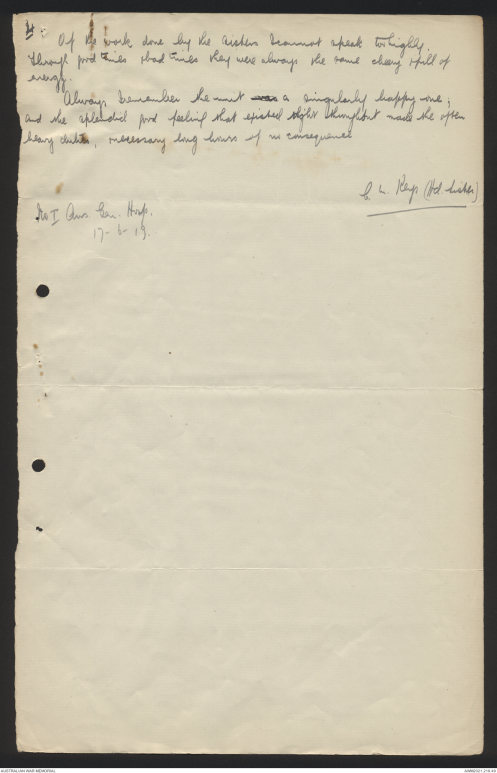
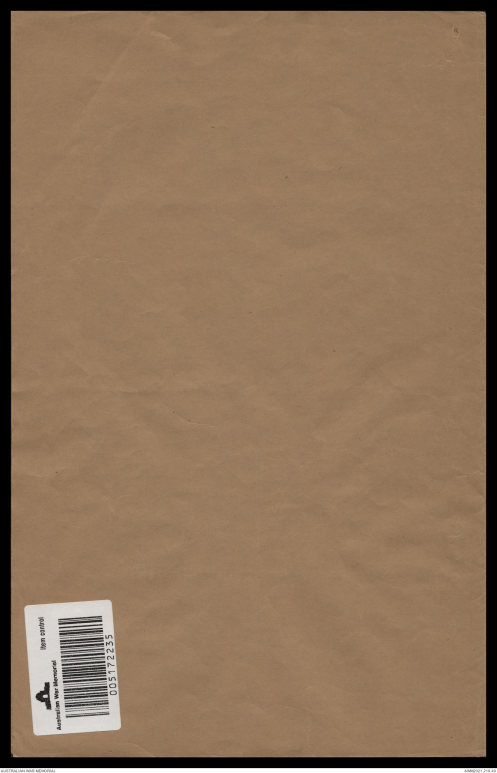
AWM 41
Butler Colln
6/82
WAR OF 1914-18
[6/20]
[[?]]
AWM 41
AUSTRALIAN ARCHIVES
ACCESS STATUS
OPEN
SISTER C. KEYS.
A. W. M.
Classn No 373.2
[990]
France
Sr. C. Keys
85/70
Feb 1918
In charge of No 2 A C C S
April 17th moved to Blendesques
during this sisters work exceedingly
heavy. Visited by several surgical
teams, these with the staff made
from 26 to 30.
Minor surgical 3 tables in dressing
rooms. Major ops 4 to 5 tables
being in theatre. Fowler beds
for penetrating chest and abd.
wounds absolutely invaluable -
would have lost many cases but
for them.
For hasty moving had packing
reduced to a fine art - QM
staff collected all ward equipment.
Sister & orderlies packed their own
dressings, drugs, etc in boxes
each labelled with ward numbers,
so when new station was arrived
at Sisters just asked for their
ward boxes. An ammunition
dump exploded frightfully
injuring 12 men — 4 died
the others lived thanks to
ceaseless care. There was no
illness to speak of among
the nursing staff at C.C.S.
[[?]] the work done by the Sisters
I cannot speak too highly —
thro' good times and bad they
were always cheery and full
of energy "
The Official War Historian of the Commonwealth
Government (Dr. C. E. W. Bean), after his study of the
collection of private war records preserved in the Australian
War Memorial Library, wrote:-
"The private diaries in this collection furnish some of its most
valuable historical records, but, like all private memoirs which were
not compiled with any historical purpose, they should not be
regarded as first-hand evidence except where it is certain that they
are so. The diarist is almost always sincere in his desire to record
accurately, but he is subject to no obligation or inducement to
indicate whether he is recording his own observations or incidents
told to him by friends or heard at third or fourth hand at the mess-table.
Thus, in some of the diaries in this collection, scenes described with
vivid detail, and without warning that they are told at second
or third hand, have been found to be completely inaccurate in
important details. A certain number also have been written up
or revised long after the events, though doubtless usually from notes
made at the time. In most cases the student must rely on his
experience and on internal evidence to guide him in judging what is
and what is not likely to be historically accurate."
85/70 70
Nursing Report on the Work done at No 2 Aus. Cas. Clearing Station
From Feb. 1918 to Feb 1919. Miss C. Keys.
On 9th Feb 1918 I was sent as Sister in Charge to the No 2 Aus. Cas. Clearing
Station. The station was then at Trois Arbres, Steenwerck about 3 miles
from Bailleul. The hospital was fairly busy, wounded being admitted
after small stunts. In March the Germans commenced the Spring
attack & things began to look serious. On Sunday, 10th, Bailleul was badly
shelled. Some shells fell in the Steenwerck railway station & there were several
casualties. Late that night we received orders to pack to move out.
Next morning - a freezing one - the patients were speedily evacuated, & at
mid day the sisters - 15 in all - left by motor ambulances for No 10 Stat. Hosp.
St. Omer. The C.O, M.O's & Personnel moved to Loste Barme & struck camp
there, but were only there a few days when they moved again to Ana Jana
Jana, outside Hazebrouck. The Indian troops were all stationed here & gave
the place the name of Ana Jana which means "Coming & Going" &
certainly the name suited it well. There the sisters rejoined the staff.
Work commenced with a great rush on the 9th April. The weather was very bad, wet
cold, in a new camp nursing was extremely difficult. Wounded patients poured
in day & night & were evacuated almost as quickly. The theatre & the dressing
room worked at the highest tension - in the latter room as many as
possible of the minor cases were operated on to relieve the theatre. In the
wards work never ceased for one second. We had an excellent Q.M.
& always plenty of food medical comforts were obtainable.
On 12th April, Hazebrouck was shelled by the enemy & orders came that day
about mid-day for the station to move on again to safer quarters. Things did
seem hopeless wounded still streaming in, & orders to close down. We did
our utmost for the men who were being evacuated almost as soon as they came
in, packed our belongings & were ready to move away at 2 p.m. I might mention
here that the orderlies were excellent. & the packing of the theatre & ward equip. had to be
left almost entirely to them. It was with sore hearts the sisters left.
Any one of whom would gladly have remained; but orders were orders & time was
short. Very reluctantly they moved off, & this time the conveyance was an old
London double decker bus. The road was extremely bad, & boggy much
cut up by the traffic which had been & still was tremendous. All the way
along to St. Omer refugees were hurrying; walking & driving, carrying all
they could of their possessions. The scene was heartbreaking, & every here & there
an ambulance full of wounded men - not knowing where to take the wounded.
We arrived at No 11 Stat. Hosp. about night fall to find there the sisters of our own
two Australian & those of several other C.C.S's there - all refugees like ourselves. That
night the 12th St. Omer was badly bombed by enemy aeroplanes, many people
were killed, buildings shattered. I must admit we did not expect to come
through safely, though all were plucky & prepared.
2
On 17th April we rejoined our unit this time at Blendesques a
little jewel of a spot a few miles from St. Omer. The next few days were
spent in getting the place bright & making the quarters comfortable.
The 25th April, Anzac Day, was celebrated by attending in the morning a
simple but most impressive church service held in the open air. In the
afternoon sports were held & visitors came from all parts. I think the sisters
must have entertained at tea 50 or more guests. In the evening an
excellent concert was given by our own Concert Party.
On 26th April wounded patients were admitted & for some days the
hospital was very busy. From June until October we had the invaluable
assistance of several visiting surgical teams. So with the anaesthetists &
theatre sisters of the teams & our own sisters our staff varied from 26 to 30.
In the busy times, as before, the minor surg. cases were operated on in the dressing room, & the major cases of course in the theatre. In the dressing rooms often 3 tables were kept going, in the theatre 4 or 5. Work varied, & the
surgical cases were light or heavy just as the fighting went.
The hospital was well arranged, & was connected by a light railway
which did great service for the station of xxxx Trois Arbres. There was little or no stretcher bearing. Cases were put on stretchers on the trolleys & quickly run to their wards. Evacuation was equally simple.
I must speak of the Fowler beds - these are frames placed under
the mattress. For patients suffering from Penetrating Chest & abdom. wounds,
& from pneumonia these beds are invaluable. With them there is none of the
incessant propping up on back rests & pillows as in the old way. Once the
head & knee pieces are raised the patient lies comfortably & nursing is very
easy. But for them we must have lost many cases.
We received many gassed patients. Inhalations of creosote were their
chief treatment. The inhalers were made of perforated zinc with a piece of wool inside on which the creosote was poured. The patients' eyes needed much treatment, & many men were so badly burnt by the gas as to be whitened from head to foot. In spite of all efforts several died.
In June Influenza made its appearance & many of the staff suffered.
In July & August, owing to the long distance they had to be transported, wounded patients were admitted more exhausted than they should otherwise have been. So on 4th Sept the station was moved forward almost to the old site occupied in April at Ana Jana, & opened for patients almost immediately. Here as before the weather was very bad nursing consequently under trying circumstances difficult. The work load was fairly heavy - with both sick & wounded. We continued here for 2 weeks & then the station was moved to what had been an asylum at St. Venant. The buildings had been badly shelled & it took right up to the end of the month, patching & repairing the parts chosen to make them fit for patients. At St Venant we received patients, & these only light medical & surgical for 6 days when orders came to move again.
We'd now grown well used to the moving "stunts" & had the packing
reduced to a fine art. In the wards all the big equip. was collected by the Q.M.
3
staff. The sisters & orderlies then packed their own dressings, drugs &c.
in boxes & each were labelled with the ward number. So when the xxx new station was opened & the sister allotted her ward, she had only to apply for her own ward boxes, the Q.M. arm supplied the rest of the equip. & in a very short time she would have the ward ready again for patients. For ourselves we packed in one box enough food - ready cooked - crockery, cutlery &c for one meal & saw that that came along with our own personal luggage in the ambulance car which was nearly always our mode of transport. When we arrived at the new home which often was for a short time only of course, a big bare marquee we had no bother about looking for food, & cooking.
Our next new station was at Nouveau Monde outside Estaires & about 6 miles
from Armentieres. A good deal of work was done there, both medical & surgical Many French civilians wounded near Lille were admitted.
On 15th Nov. the C.C.S. received cases at a new station at Tournais a
beautiful old city in Belgium & famous for its cathedral. The building we
occupied was very large & accommodated 2 C.C.S's, & was used by the Germans as an hosp. Except for being extremely dirty it was in fairly good order. Although we loved tent life it really was good to be in a building high & dry out of the wet. Admissions were many, & these chiefly influenza & of a very bad form - we lost several of these cases. Many released Prisoners of War passed through this station, & it is needless to say of course how they felt about being with their own people again, & how they enjoyed the good food. The electric light, the heating, & the water ^supplies were just about righted . Fritz had taken away with him the men who worked there, when orders came to move again. So after about 2 weeks work at Tournais ^where we very reluctantly left we opened again at Ath, a small town about 2 hrs run
from Brussels, — a building that had been a Belgian hospital & was also used
by the Germans as one. It of course made an excellent hospital for us.
Cases of influenza were not so numerous, & the majority of cases admitted
were light medical. Many P.O.W. passed through here too.
Xmas Day was a memorable one, & everyone did his utmost to make it so
for the patients.
On 27th Dec. there was a big ammunition explosion at the railway station
& as a result of it 12 men were admitted to the hospital terribly burned - not
an inch of their bodies seemed to have escaped. They were piteous sights &
suffered agonies. During the next few days 4 of them died, & but for ceaseless
care day & night the others would have died also.
During January 1919 the work slackened, but in February influenza
broke out again with renewed force & many deaths occurred.
Ath proved the last station for No 2 A.C.C.S. & early in March
it was handed over to an R.A.M.C. Field Ambulance who carried on the
work.
C.C.S. life being mostly out of doors, was naturally a healthy one
with always an abundance of good food, among the sisters there was
next to no illness to speak of.
4
Of the work done by the Sisters I cannot speak too highly.
Through good times & bad times they were always the same cheery & full of
energy.
Always I remember the unit was a singularly happy one;
and the splendid good feeling that existed right throughout made the often
heavy duties, & necessary long hours of no consequence.
C. L. Keys (Hd. Sister)
No I Aus. Gen. Hosp.
17-6-19.
Item Control
Australian War Memorial
005172235
 Loretta Corbett
Loretta CorbettThis transcription item is now locked to you for editing. To release the lock either Save your changes or Cancel.
This lock will be automatically released after 60 minutes of inactivity.